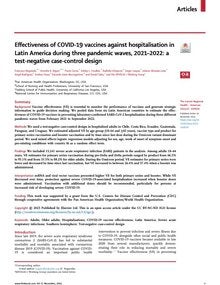Summary
Background: Vaccine effectiveness (VE) is essential to monitor the performance of vaccines and generate strategic information to guide decision making. We pooled data from six Latin American countries to estimate the effectiveness of COVID-19 vaccines in preventing laboratory-confirmed SARS-CoV-2 hospitalisation during three different pandemic waves from February 2021 to September 2022.
Methods: We used a test-negative case-control design in hospitalised adults in Chile, Costa Rica, Ecuador, Guatemala, Paraguay, and Uruguay. We estimated adjusted VE by age group (18–64 and ≥65 years), vaccine type and product for primary series vaccination and booster vaccination and by time since last dose during the Omicron variant dominant period. We used mixed effects logistic regression models adjusting for sex, age, week of onset of symptom onset and pre-existing conditions with country fit as a random effect term.
Findings: We included 15,241 severe acute respiratory infection (SARI) patients in the analysis. Among adults 18–64 years, VE estimates for primary series vaccination during pre-Delta and Delta periods ranged by product from 66.5% to 95.1% and from 33.5% to 88.2% for older adults. During the Omicron period, VE estimates for primary series were lower and decreased by time since last vaccination, but VE increased to between 26.4% and 57.4% when a booster was administered.
Interpretation: mRNA and viral vector vaccines presented higher VE for both primary series and booster. While VE decreased over time, protection against severe COVID-19-associated hospitalisation increased when booster doses were administered. Vaccination with additional doses should be recommended, particularly for persons at increased risk of developing severe COVID-19.
Funding: This work was supported by a grant from the U.S. Centers for Disease Control and Prevention (CDC) through cooperative agreements with the Pan American Health Organization/World Health Organization.
Open Access. Published:November 10, 2023 DOI:https://doi.org/10.1016/j.lana.2023.100626
|

